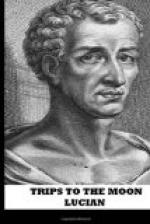{114a} Tyro, according to Homer, fell in love with the famous river Enipeus, and was always wandering on its banks, where Neptune found her, covered her with his waves, and throwing her into a deep sleep, supplied the place of Enipeus. Lucian has made her amends, by bestowing one of his imaginary kingdoms upon her. His part of the story, however, is full as probable as the rest.
{114b} Suberipedes, cork-footed.
{116a} This description of the Pagan Elysium, or Island of the Blessed, is well drawn, and abounds in fanciful and picturesque imagery, interspersed with strokes of humour and satire. The second book is, indeed, throughout, more entertaining and better written than the first.
{116b} See the Ajax Flagellifer of Sophocles. Lucian humorously degrades him from the character of a hero, and gives him hellebore as a madman.
{118} It is not improbable but that Voltaire’s El Dorado in his “Candide,” might have been suggested to him by this passage.
{119} I.e. Their appearance is exactly like that of shadows made by the sun at noonday, with this only difference, that one lies flat on the ground, the other is erect, and one is dark, the other light or diaphanous. Our vulgar idea of ghosts, especially with regard to their not being tangible, corresponds with this of Lucian’s.
{121a} A famous musician. Clemens Alexandrinus gives us a full account of him, to whom I refer the curious reader.
{121b} This poet, we are told, wrote some severe verses on Helen, for which he was punished by Castor and Pollux with loss of sight, but on making his recantation in a palinodia, his eyes were graciously restored to him. Lucian has affronted her still more grossly by making her run away with Cinyrus; but he, we are to suppose, being not over superstitious, defied the power of Castor and Pollux.
{122a} Nothing appears more ridiculous to a modern reader than the perpetual encomiums on the musical merit of swans and swallows, which we meet with in all the writers of antiquity. A proper account and explanation of this is, I think, amongst the desiderata of literature. There is an entertaining tract on this subject in the “Hist. de l’Acad.” tom. v., by M. Morin.
{122b} Who ravished Cassandra, the daughter of Priam and priestess of Minerva, who sent a tempest, dispersed the Grecian navy in their return home, and sunk Ajax with a thunder-bolt.
{123a} A scholar of Pythagoras.
{123b} The second king of Rome.
{123c} One of the seven sages, but excepted against by Lucian, because he was king of Corinth and a tyrant.
{123d} See his Treatise “de Republica.” His quitting Elysium, to live in his own republic, is a stroke of true humour.
{124a} Alluding to a passage in Hesiod already quoted.
{124b} Lucian laughs at the sceptics, though he was himself one of them.
{126} Death-games, or games after death, in imitation of wedding-games, funeral-games, etc.




